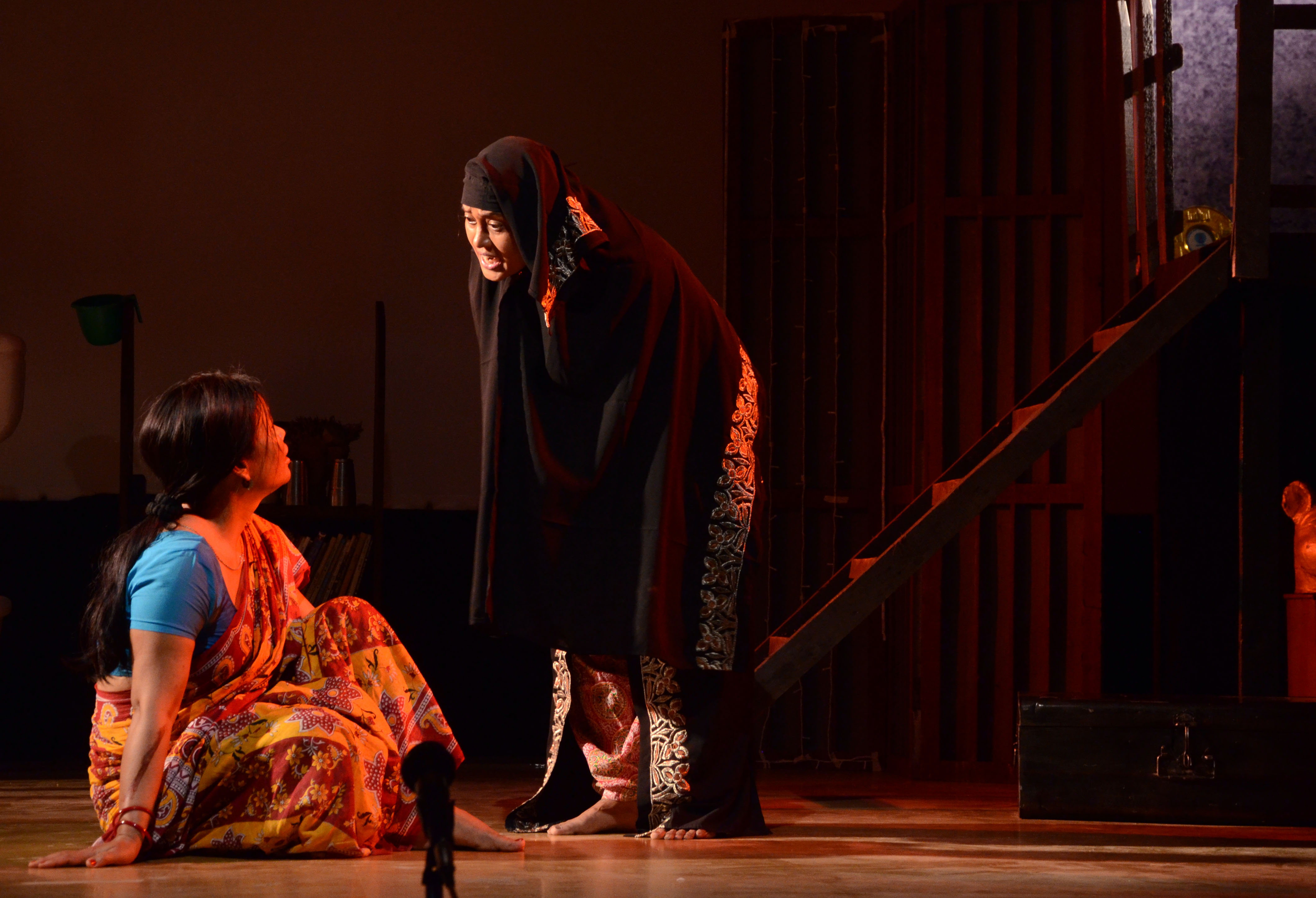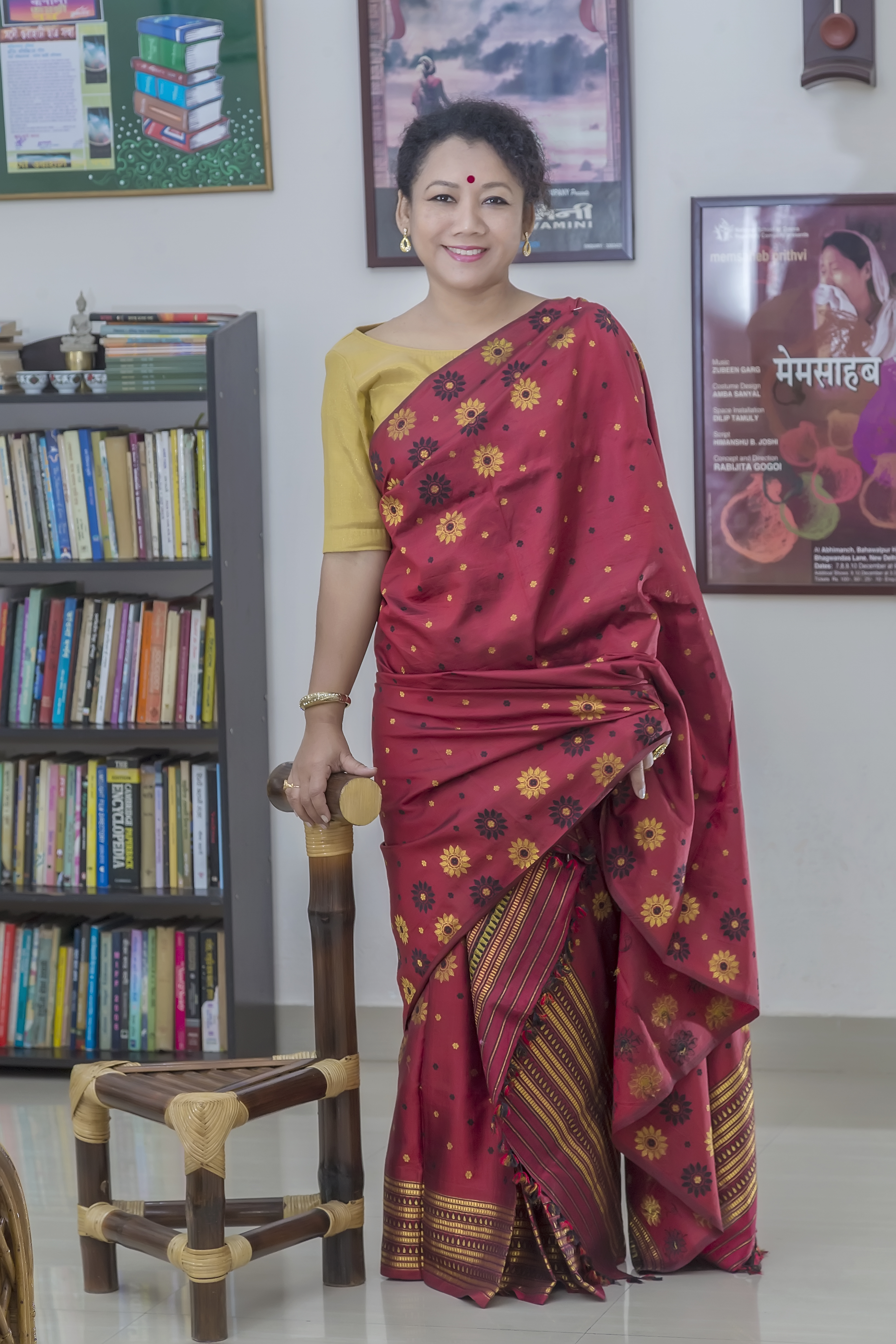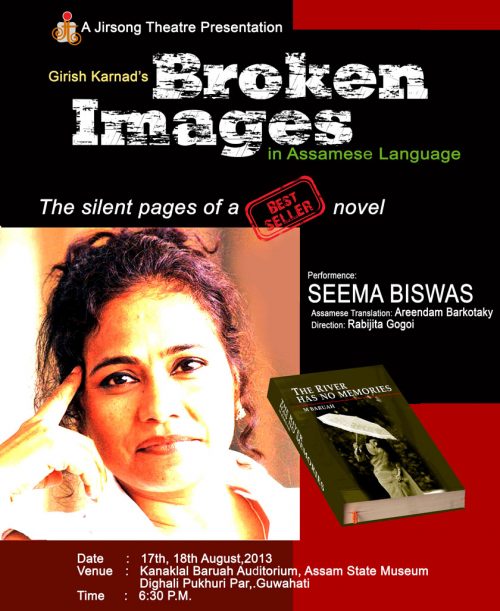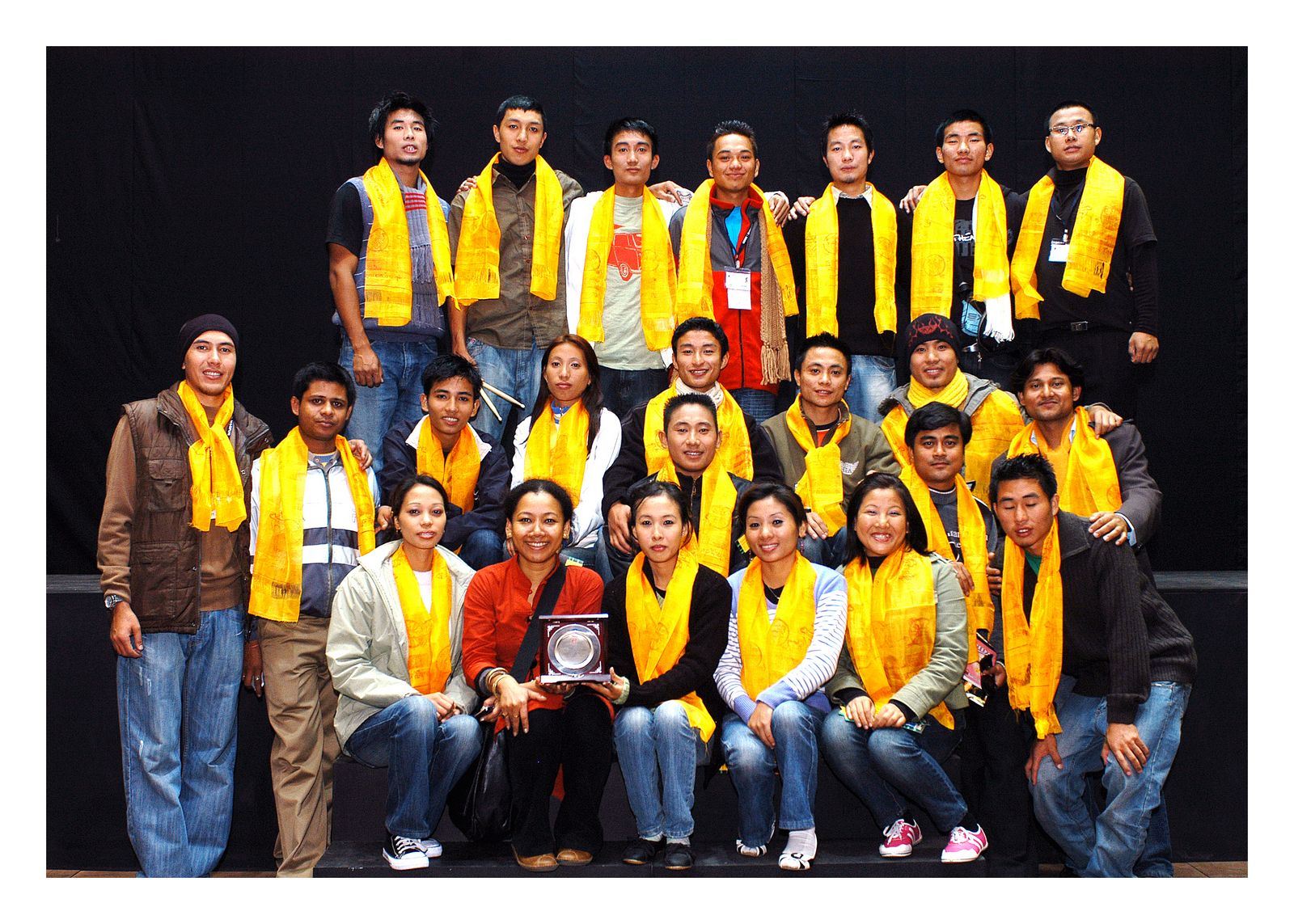This Powerhouse Director from Assam is Creating Ripples in Indian Theatre!
Rabijita Gogoi took up direction at a time when there were very few women directors in India. After directing close to 25 plays in a host of Indian Languages, she is back in Assam for a permanent stint.

Her apartment in Noonmati in Guwahati sits sequestered on a hillock, and cannot be seen from the busy main road. As we settled down for a chat with cups of green tea and oatmeal cookies, Rabijita says it was a deliberate attempt at getting away from the ‘city’, having lived in Mumbai for the last decade or so.
And, since her home is also her workshop, she needed a quiet place to practice her craft. Her day begins early, and she practices with her team until around 3 pm, when daylight starts fading, and her daughter comes back from school.
Her latest production, Bagh, was recently performed to a packed hall in Sibasagar in Upper Assam.
It is the tale of two women, one in a burkha and another in a saree, who find shelter in an abandoned house, while outside, communal riots continue.

This particular story is almost like a social commentary; it questions our presumptions about the saree and the burkha and what they have come to signify. At one point, the stories of the two women merge into each other.
Rabijita has written plays in a host of Indian languages: Assamese, Hindi, Kannada, Nagamese, Bodo, and Karbi. She has also interpreted international plays such as Marguerite Duras’s La Musica (French), J M Synge’s The Riders to the Sea (Irish), Harold Pinter’s The Dumb Waiter (English), Bijoy Tendulker’s Kanyadaan, Mohon Rakesh’s Aashad Ka Ek Din and Joy Shankar Prashad’s Dhruvswamini.
Her next play will be the Greek classic, Antigone, but she has taken the liberty to set it in contemporary Karbi Anglong, with its deep divisions and confrontations.
Apart from direction, Rabijita conducts workshops to mould young actors from Assam. She is also a professional acting instructor and was a part-time teacher at Anupam Kher’s acting institute in Mumbai for two years. She recently curated plays for the Second Women’s Theatre Workshop in Kerala.
Talking about the State, Rabijita says, “As far as theatre goes, Kerala has a lovely atmosphere for artistic exploration, the writers are not afraid to experiment, and the actors also back them up beautifully. But we have miles to go…”
Rabijita has also conducted many workshops in Assam, one being a 16-day workshop on the Stanislavsky method of acting.
(According to this method, an actor’s training should go beyond mere physical and vocal training. It should include what he calls the “art of experiencing”, whereby the actor can activate psychological processes, emotional experiences and subconscious behaviour.)
Growing up in Diphu

Having grown up in Diphu, the small hill town of Assam, with a predominantly tribal population, Rabijita’s first ten years were free and idyllic. Her parents had migrated to Diphu in the 60s when the State Government was setting up schools in Karbi Anglong and was on the lookout for qualified teachers.
She shares, “By the time my siblings and I were born (two younger brothers), our parents had built an Assam-type house there and planned to settle in Diphu for the rest of their lives. It was a charmed childhood: our classroom was mixed: Nepali, Dimasa, Karbi, all of us studied together in relative harmony. I spent most of my time reading Assamese literature, Mamoni Raisom Goswami, and Homen Borgohain, or cycling around town. I remember one particular incident very well when I was around 14-years-old; Deuta (Father in Assamese) was the one who would bring me books from the local book fair or Axom Xaxitya Xabha sessions. Once, he brought home Homen Borgohain’s autobiography, Atmanuhandhan, and I read it at one go, refusing to do anything else during that period. This absorption with things continues in me till date.”
She penned her first play when she was in class X. It was around this time that she developed a greater interest in the art form and acted in many plays at Diphu College.
For further studies, she moved to Guwahati and enrolled in Handique College for a Bachelor’s Degree in Political Science.
Also Read: Meet Director Haobam Paban Kumar Whose Films About Manipur Are Showcased in Busan & Berlinale
She recalls, “I remember my hostel and college days with great fondness. Senehi Begum, the well-known academician, was our Hostel Warden and she was lenient with timings, encouraging hostelers to pursue their passion. In Diphu, I was a loner, preferring to settle in a corner with a book of poetry by Nilamani Phukan. I wrote poems too, on the sly. Here, it was as if my senses had exploded and I had to make sense of this chaotic world through real interactions.”
From her own experiences and interactions in Guwahati stemmed her next few plays. “I wrote about what I knew best. Atmaj was the story of four women living in a hostel, who were struggling to find their space. Jatra was about life in Guwahati and the Cotton-Handique crowd of that time still remembers it.”
Accolades too came in; she was judged as the best actor for essaying the role of a woman who visited a city office daily to avail pension for her husband in a play called Guwahati, Guwahati. The play was directed by prominent actor Baharul Islam for Kahinur Natya Prarambha of Ratan Lahkar.
She also worked with actor Indra Bania for six months, who had been feted at the Locarno International Film Festival for his work in Halodhia Choraiye Baodhan Khai by Jahnu Baruah.
The NSD and Delhi Experience

In the early 90s, when Rabijita had gone to Delhi to study direction at National School of Drama, there were hardly any actors from Assam or the Northeast at the prestigious institute. And, if you looked at the number of women, it was negligible. This did not deter her.
She applied to NSD and was accepted for a Masters in Direction. She talks about her initial inability to adjust to a city where at every turn lurked a possible harasser.
Inside NSD, I could create my space. But outside the campus, it was difficult to get used to constant harassment as a woman, and that too from the Northeast. This hostility was new for me.
However, she stuck it out and was eventually known for the plays she directed, sketching stories of women and men from the milieu she was familiar with, but also exploring uncharted territory, such as her first play under the NSD banner, Dhruvswamini, a historical play set in the Gupta period.
She went on to direct many other memorable plays. Ram Gopal Bajaj, the erstwhile NSD Director was impressed with her work and asked her to continue directing plays under the NSD repertory company as a visiting faculty.
During her NSD days, she was quite influenced by Ratan Thiyam, a leading figure in the Indian theatre movement. “Understanding his colour sense, his sense of composition was a revelation. The other director I was taken up with was Prasanna from Karnataka. Seeing their process was a learning experience. From Prasanna, I learnt about “accuracy of expression”; he worked on it a lot. I also learnt a lot from Naseeruddin Shah, especially about how to direct an actor.”
Living in Bombay

She lived in Delhi for a couple of years after NSD and then moved to Mumbai as a researcher and assistant director to TV shop SWARAJ, having married an actor.
“This, I think, was a lean phase. Though we may contest the fact that bearing a child takes a toll on your career, it does, considering it is still seen as a woman’s responsibility. The first few years in Bombay were difficult with no childcare or family to depend on.”
Rabijita also points out how some actors find women directors ‘bossy’. She shares,
When a man says “Go there”, it is accepted, but a woman is supposed to say, “Why don’t you go there?”. Taking orders from a woman is never easy for most men.
But having found her feet after the initial years of struggle, Rabijita continued directing and acting in plays around the country.
“But this expression of women’s suppression has resulted in an explosion of plays by women. When a woman directs a play, let’s say, a scene where a drunken man is beating a woman, she shows the women’s resistance as well, that she is not passive. This had led to an interesting period for Indian theatre when stories brushed under the carpet so far were coming to the fore.”
You May Also Like: Rise of the Web Series: Indian Directors On What It Takes To Make Internet Films
Plays like Bahu by Tripurari Sharma and Rodali by Usha Ganguli, and performances by Maya Krishna Rao reflect this phase in Indian theatre.
For her second innings in the city, Rabijita hopes to create a culture of theatre where artists are not paid a pittance and can take it up as a profession.
It is incredibly hard to make a living in theatre; there is no money or glamour. But there are theatre groups in states like Kerala and Punjab that have found a model that works for them. I wish to develop a similar atmosphere here and add to the efforts of the others like Bhagirathi or Kismat Bano; one is an established actor/director and the other, though young, has shown great maturity in her work.
It has been 25 years since Rabijta started her journey. Here’s hoping that she gives voice to the myriad stories that make up Assam.
(Written by Nasreen Habib and Edited by Shruti Singhal)
Like this story? Or have something to share? Write to us: [email protected]
Connect with us on Facebook and Twitter.
NEW: Click here to get positive news on WhatsApp!

Similar Story

Kyani to Nirula’s: Artist Takes India Down Memory Lane with Sketches of Iconic Eateries
Aditya Raj from Jaipur visited an exhibition during his law school days and decided he would be an artist. Here’s his visual representation of a nostalgia trip with pictures of the most iconic eateries in India.
Read more >
If you found our stories insightful, informative, or even just enjoyable, we invite you to consider making a voluntary payment to support the work we do at The Better India. Your contribution helps us continue producing quality content that educates, inspires, and drives positive change.
Choose one of the payment options below for your contribution-
By paying for the stories you value, you directly contribute to sustaining our efforts focused on making a difference in the world. Together, let's ensure that impactful stories continue to be told and shared, enriching lives and communities alike.
Thank you for your support. Here are some frequently asked questions you might find helpful to know why you are contributing?


This story made me
-
97
-
121
-
89
-
167












